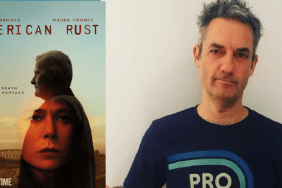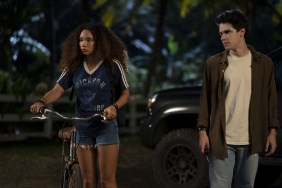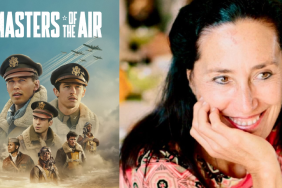
During the early ‘80s, The Police came on the scene with a distinctive look as singer/bassist Sting, guitarist Andy Summers and drummer Stewart Copeland created an original sound that mixed punk, ska and reggae with upbeat catchy hooks, which quickly found an audience first in England and then in the States and elsewhere. Over the next five records, the band’s sound progressed away from their punk roots, turning them into one of the biggest rock bands in the world, at which point, they systematically disbanded until 2007, when they returned with a year-long reunion tour that sold out stadiums worldwide.
While Sting has been very outspoken over the years with his solo career and other ventures, guitarist Andy Summers has remained more of a mystery with few Police fans knowing about his early days on the London music scene in the mid-60s that led to him playing guitar for Eric Burdon and the Animals.
That era and the Police’s early days as well as their triumphant return are all covered from Summer’s point of view in Andy Grieves’ documentary Can’t Stand Losing You: Surviving the Police. Based on Summer’s book “One Train Later: A Memoir” and using many of the pictures that Summers took during his tenure with The Police, the film is one of the more creative music docs that uses a similar technique as The Kid Stays in the Picture and The Who: Amazing Journey to tell Summers’ story. It also mixes archival footage of the band with new footage shot during the 2007 reunion tour.
ComingSoon.net had a chance to sit down with Summers when the movie premiered at DOC-NYC, and got to ask a few questions we’ve always wanted to ask him about what happened with The Police.
ComingSoon.net: I know you had written the book, so was the movie being filmed at the same time?
Andy Summers: No. The way it worked was that the book came out somewhere about that period of the book emerging, I had contacted Brett Morgen, who made this film called The Kid Stays in the Picture, which I was so inspired by. I thought it was a great idea—those still photographs and the voice-over and not much else. I saw in my own mind what I was constructing, this photography book that I had and I really liked the way this was done. I have the written biography, I have this massive book of photographs of the whole existence of The Police, I should contact this guy. Just by sheer chance or whatever, I met somebody in L.A., a film music supervisor, who I mentioned this thought to and she said, “I’m good friends with Brett, I’ll put you straight in touch with him.” I contacted Brett and sent him the autobiography first and he responded immediately, “This is really great. I’d be really interested.” We did meet and I showed him the photographs and he wanted to do it. He was going to be the director, and we started the process and I hooked him up with another producer in L.A. We got going on it and we sold the film like that to somebody right away. Someone at the Yari Film Group agreed to finance it literally the same day we tried to sell it. That was kind of miraculous. No problem.
CS: This was still before the reunion?
Summers: Before the reunion, yeah, because I know that I had met Norm Golightly, who was the other producer. He just came out of the blue and contacted my agent in L.A. and said, “I’d really like to meet Andy Summers. I think there’s some stuff we could do with him.” He asked to meet me, this guy, and I said, “Well, okay, sure. I’ll meet him.” I met him in Hollywood one night, we had dinner. He was a very nice guy and we had a chat. He had been working with Nick Cage for ten years and would I like to come in and do some music. I knew at that point that I was going on tour with The Police, so I wouldn’t have the time but said, “Let’s stay in touch.” The thing then went down with Brett, and I said there’s a guy in L.A. that I thought would be very interested in getting into this and I put them together. Suddenly, I had these dynamic young bucks thinking about this movie. Christ, how did that happen? And off we went. Norm had the contacts with Yari, for instance, and they wanted it immediately. It was sort of amazing how it all happened, because I didn’t think I’d ever get a film made. I just wanted to write the book. But then I saw The Kid Stays in the Picture and thought, “What if I could do that?”
CS: That movie gives a really good idea of what you can do to bring someone’s life into a movie.
Summers: Incredible, the animation. Technically brilliant and groundbreaking. Of course, Bob Evans was ever so great, so that’s where it started.

Summers: They went with it. There’s always a little bit of “Oh, what are you doing?” There’s always a little bit of jealousy, but they were basically okay with it. I think more what happens is that the managers of the various entities get upset but the guys, yeah, they were pretty cooperative.
CS: I guess you have to explain to them that it’s not really about The Police. One of the things that’s interesting was that I was speaking to someone before coming here and I told him I was going to talk to you and he said “Oh, you should find out about his background before the Police.” But if you see the movie, there’s all this stuff that probably 99% of Americans and even Police fans won’t know about.
Summers: Nah, you get known for one thing and people don’t really get much past that. As the artist, I suppose I could go, “Did you see this that I did?” and “I did this and I did this,” but people know one thing and that’s what they associate you with. It’s kind of frustrating, but I think a lot of people go through this. On the other hand, you’re lucky to get anything in this game. It’s really hard, so… (chuckles)
CS: I was amazed also that you started The Police when you were already in your 30s, which is almost unheard of now.
Summers: Not on schedule, because in my life, I went to Howard’s End in London in the ‘60s and I started out with Jimmy Page and Eric Clapton is a really good friend of mine, Jeff Beck, all these guys. We all sort of started at the same time and somehow I wasn’t in the right framework. Then I came to America, and I sort of buggered off for five-and-a-half years. Went to L.A., went to college, did other things and stopped being in the rock scene. I felt like I had enough of it at 25. I was sort of done. I won’t do it anymore. But I was of course obsessed with music and I went rusty in L.A., did all that. Then was faced with the prospect of making a living and so I came back to London and three years later, I was in The Police.
CS: So basically you were part of this amazing music scene in the ‘60s and then you come back and get back just as this other music scene is starting.
Summers: Yeah, I know. It’s kind of an amazing story, because I came back and within three years, the punk scene was happening, so there I was, fully fledged as a musician. What do I do? I take a double left turn into a scene where music ability wasn’t that valued, which was the punk scene. But the truth was that in The Police, actually we could all play. (laughs) We were sort of fake punks. That’s where it started, in the furor of all that, and got us noticed and of course, the rest is history. We sort of transcended those roots from that scene pretty quickly.
CS: I remember you guys having music videos even before MTV started. Am I wrong in that?
Summers: Yeah, I’m trying to think exactly but we were making music videos before MTV, definitely.
CS: I think my first experience hearing The Police was on this UHF channel where they showed music videos.
Summers: Yeah, you’re right because MTV came out in 1982 and we were in New York and were taken to this place where we told “This is going to be called MTV” and we were like “What’s that?” because it was a new thing then. “Music television? 24-hour music? What?” We were getting used to this thing and whether it was going to be something and then we started being on it in 1983, and we knew all the people, the directors and everything. They made us the band of the year. Of course, we’d been existing before that and we made a lot of videos for everything. We were already a hot item. So we picked it up with MTV in 1983 and they were always out interviewing us. But that was the fifth album, so clearly, we hadn’t made four albums and not made any music videos.

Summers: I’m trying to think back to all the songs and what we did. We must have done something for “Roxanne,” “Can’t Stand Losing You”… and we were on television a lot. One that’s coming to mine is “Invisible Sun” working with this guy, Derek Jarman, and it got banned by the BBC. They wouldn’t show it because it showed scenes of gun shooting in Northern Ireland. So they were showing it on the news but they wouldn’t show it as a music video. It was ridiculous. “But you just showed it on the program before so it can’t be a music video? The song is about a serious subject matter, being a kid in Belfast, so that’s why that footage is in the film, to underline the lyric.”
CS: I was always curious how that got going that The Police were doing music videos long before other bands were doing them.
Summers: Yeah, we did them and we did them with Godley and Crème. I try to think of all the videos we did. I’ve never thought about it that much. We did “Wrapped Around Your Finger,” we did “Every Breath You Take,” we did “Synchronicity.”
CS: Making a movie like this and looking back, you already did it once for your autobiography, so is it hard to keep going back and replaying those times?
Summers: Yeah, it is a bit wearing to keep going over the same ground, and every time you do an interview or whatever, trying to put some fresh words into it, come at it from a different angle. I can surprise myself occasionally. “Oh, I never saw that one before” and something comes in and I go, “Oh, that was good.” It depends on the situation of the interview and the interviewer and what questions you get asked. But essentially, I keep going over the same material. I don’t know if this is going to put it away or not. We’ll see what happens next.
CS: To me, I consider it a conversation.
Summers: Yeah, it should be. The kind of interview I don’t like is when you’re responding to something they ask and they’re reading off the page and they’re not really listening to you. They’re nervous and they’re just looking at the next question. And you wonder, “Why don’t you just listen to what I just said and let’s have a dialogue?” Then it’s good.
CS: That’s why I tend to lose my place because I’m not thinking about my next question. I was reading an interview I found in Cream from 1982 that I found completely by happenstance while researching this. It’s interesting because it seemed like at that time there were already cracks and seams in The Police, but when the band broke up, it wasn’t something that was announced. You made a record and you toured and you just didn’t do it again.
Summers: We just went away. No, it was very irritating, and that really came from Miles Copeland, who at that point was the manager of the band and went on to become the manager of Sting. We were told not to say anything about it, and then things would come up. One of us would make a record or whatever and press would start asking. We had to cover it up for a couple of years anyway, and I just couldn’t stand it. I said, “No, we definitely did break up.” I couldn’t stand the lie, but that’s how it happened. We didn’t say, “Yeah, that’s it, we’re finished now.” Which would have been much cleaner and had more shock value.
CS: It’s odd because we’re used to seeing the stories of bands that peak and then they keep making records that sell less and less until they finally break up, but I think The Police is one of the few bands, along with Led Zeppelin, that never hit a downwards slope before they finished.
Summers: No, we never started going down the other side of the curve, which is a great thing in a way. We got off at the top, because Sting wanted to be solo, that’s it. We made five records for A&M and he was trying to say that it was time to get off, it’s time to stop. What we should have done probably is to say, “No, let’s take two or three years off and then we’ll come back and just destroy everything again, and it will be great. We’ll be even bigger.” But that wasn’t the way to be. It wasn’t just, “Oh, what a courageous thing to do—get off at the top.” I think we were kind of befuddled and confused. But we did stop, but of course then we did that tour again ’07 and ’08 that was such an incredible blow-away tour that it kind of put a lot of things to rest.

Summers: I don’t know. No, I don’t think it was that. I think it did do that in a lot of ways. It was cathartic, because for years, all the years in between, (it was) “When are you guys getting back together? Everyone wants to see it. If you guys come back, you’ll be the biggest band on the planet.” Yeah, we’d get that for years and it took 20 years. We should have done it after ten. Anyway, we did it and in fact, we were the biggest band in the world again. (chuckles) It all came true! We weren’t expecting that. There’s like, “What if this is just a joke and we go on and it’s not very good?” And we didn’t really know until the tickets were on sale. We sold out three stadiums in two hours and that’s like, “Here we go.”
CS: Was it easy to get back into the room together and start playing together again?
Summers: No, it was difficult, not ‘cause of the music. Because I’ve played these songs a million times, I know them inside out. No problem with that so much as the atmosphere in trying to relax into being a band. It was difficult at the beginning—I didn’t think we would make it. It was tough the first few days because there’s that thing, “Oh, God, to be back here again, confronting this.” It was tense, but I sort of said to myself when we were in Vancouver, “Gotta get through this, gotta make this work. Whatever it takes. You won’t get this shot again like this.” So we did it, and in fact, it was already too late. Everything was in process, the machine was rolling at a serious level. Money being spent. It was very difficult to step out of it once it was going, so we did do it, and it was an incredible tour. On many levels it was very satisfying: one, my kids got to see it, which was great for me, instead of me saying, “Hey, I used to be in this rock band, it was really good.” So they all came as late teenagers. Obviously, it was financially a great golden handshake, and we were able to prove that we really were that good, and it was great for many people who wanted to see it again. Very cathartic for a lot of people who are now older. We’d get on stage and people would be sobbing in the front row, the shock value, because the way we did it at the show was that we’d come on stage and not have the full color lights. We’d come on in pure white light, so it’s a shock to play “Message in a Bottle” as people would just practically break down and start sobbing. No lights, just white light, you know, “Here we are.” It’s so real and then go onto a second song and all the colors would come up and off we go.
CS: I saw the show at Madison Square Garden and I’d seen The Police play there in ’83 which was weird to see it when I was just a teenager and then when I was quite a bit older. Then I saw you again at Jones Beach towards the end of the tour and it seemed like you had changed arrangements.
Summers: Yeah, it was one of those things where we kept tightening it up, tightening it up, honing it, sort of like the whole set was a work of art and you just keep refining, touching it up, doing little things. Subtle moves, but gradually the whole thing gets smoother, tighter. Everybody knows where they are, it’s good. I think it worked well.
CS: I’m always musing on the fact that composers like Beethoven or Mozart died before they could see what a legacy they created with their music, but with The Police, you can see how the songs kept the band alive even during the break, as seen in the karaoke scene in the film.
Summers: Yeah, that’s true. Completely ongoing. I mean, that kind of thing, the karaoke scene. I had just come back from Brazil and this must have happened to me ten times when I was in Brazil for a month. I’d walk into restaurants and stores, that kind of stuff. One thing about The Police stuff is that it remains so consistent on the airwaves, everywhere from grocery stores to restaurants to gas stations. It’s always there. You’re not hearing Led Zeppelin or Deep Purple. It’s just so consistently always on the airwaves. It seems to happen all the time with The Police–it never went away. That’s just part of the fabric.
CS: I know you’ve been doing instrumental albums for a while and photography…
Summers: Yeah, I did a lot of that. Right now I’ve got a really great rock project that I’ve been working on since February with a wonderful singer called Rob Giles that I met about a year ago. Killer. He was in a band called The Rescues. Very talented guy and basically we’ve been making a rock record since February on and off but we’re pretty much finished with it. Killer rock songs, you know, guitar-driven rock. Great hooky songs, it’s exciting. I played it on the radio this morning on the Jim Kerr show and they were blown away by it. So I’m very excited about that, so as I finish up these other projects this year, I’m really going to focus on that next. So hopefully that will be right after the New Year, we’ll start getting that out there. (Note: This band is called Circa Zero and their first album “Clrcle Zero” was released in 2014.)
CS: What would you like people to get out of this movie, whether they’re a Police fan or not?
Summers: Well, this is going to be the first time for me where I’ll sit with an audience and see it on a bigger screen with all the sound. In fact, I’m not going to sit out in the foyer—I’m going to sit and watch the movie ‘cause I haven’t seen it like that. And see how people react. I’m not really sure what to expect from it, like what should I expect? Some huge career boost or what? I don’t really know what to expect. It’s a film that’s great, I really enjoyed it, but it comes and goes. Three years from now, they’ll go, “Oh, yeah, you made that film.”
CS: If anything else, it will give people some perspective and see a different look at things they think they know.
Summers: Yeah, it’s wonderful to have something like this done about your life. It’s tremendous, and if anything, it cements your place in the history a bit more. That’s it. I don’t know. I’m not expecting a gold medal or anything.
Can’t Stand Losing You: Surviving the Police opens in New York City at the Village East Cinemas on Friday, March 20, and then in Los Angeles on March 27.
Can't Stand Losing You
-
Cantstandlosingyou 01

-
Cantstandlosingyou 02

-
Cantstandlosingyou 03

-
Cantstandlosingyou 04

-
Cantstandlosingyou 05

-
Cantstandlosingyou 06

-
Cantstandlosingyou 07

-
Cantstandlosingyou 08

-
Cantstandlosingyou 09

-
S_036.tif

s_036.tif









